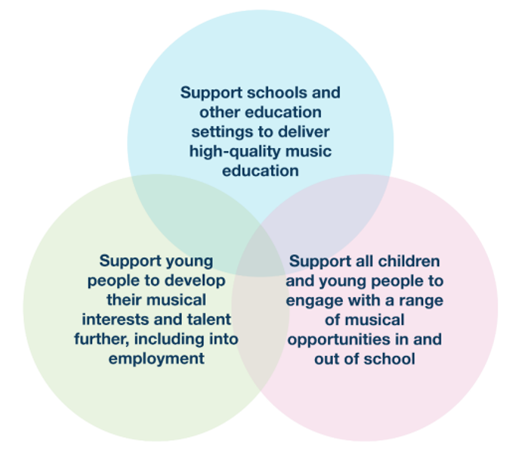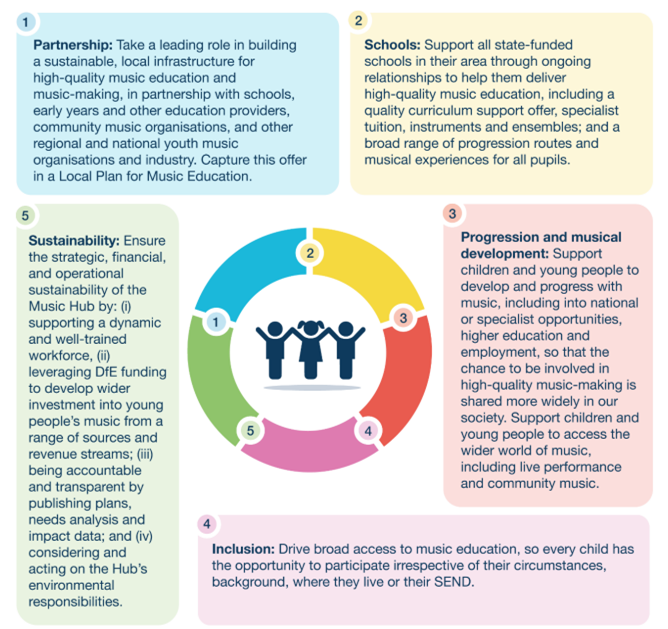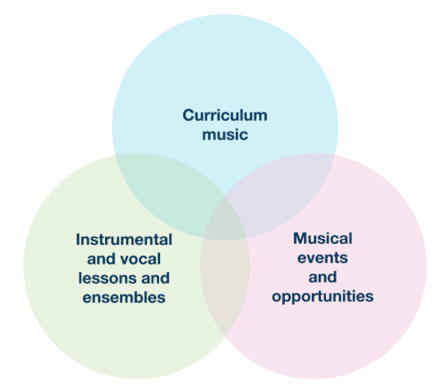Step 1
Where to start?
Step 2
Why music?
There are many studies throughout the world about the wider benefits of music, music education and learning music. Some of the benefits identified are:
- Improves confidence and motivation through practice and performance
- Practice improves learning ability and memory
- Supports healthy mental wellbeing
- Music lessons and exams contribute to awards,UCAS points and Duke of Edinburgh awards
- Playing an instrument provides an outlet for creative expression
- Playing supports coordination and fine motor skills
- Group work facilitates teamworking and social skills, and helps children make friends
- Improves active listening skills
Download the benefits of music posters:
Step 3
Why being clear on your vision for music in your school is important
Information available on page 12 of the HMS 'Building a high quality music education publication'.
Step 4
What should school leaders look for to assess the quality of the music curriculum in their school?
Subject knowledge and skill audit
HMS has developed a skills audit that you can use to establish the range of musical skills and knowledge in your school.
Step 5
What else should be considered?
Information available on page 16 of the HMS 'Building a high quality music education publication'.
You may find this list of organisations that support music useful.
Download the benefits of music posters:
Step 6
National Plan for Music Education (NPME)
Music is a cornerstone of the broad and balanced education that every child should receive. It touches hearts and minds, it celebrates and challenges, and it connects us and moves us.
In the same way that we teach children literacy and numeracy to prepare them for adult life, we must also give them the musical tools they need for a lifetime of music-making and enjoyment. For some, music will be the foundation of a career in one of the country’s most important and globally-recognised industries. For others, it will provide experiences and skills which develop their creativity. For many, music will simply be a source of joy, comfort and companionship throughout their lives.
The National Plan for Music Education, with a refreshed strategy, is designed to deliver an excellent music education for all, with partnership at its core sets out:
- a vision
- three aims
- five strategic functions
NPME vision
“Our vision is to enable all children and young people to learn to sing, play an instrument and create music together, and have the opportunity to progress their musical interests and talents, including professionally”. - National Plan for Music Education 2022
Three aims
Underpinning this vision, Music Hub partnerships, such as HMS, will focus on three aims:

Five strategic strands
To achieve these aims, HMS as a Music Hub lead organisation, are accountable for government’s funding, we have a responsibility for five strategic functions, to be delivered through the partnership.

It is vital that HMS builds strong relationships with schools, academies and multi academy trusts (MATs). While it is the responsibility of all schools and academies to deliver music well, HMS should support and empower schools, academies and MATs to excel:
- HMS communicates the hub offer to school, what we do and could do, to support pupils, school/trusts via our Services for School offer.
- All schools, academies and MATs should have a School Music Development Plan, owned by the school. HMS is able to support school to develop them.
- Discussions should be two-way and HMS will consider what the school/trust could offer its wider community, through and in partnership.
- HMS will offer training, networking, and music learning opportunities for teachers in Hertfordshire, working in partnership with future Lead School for Music, national resources offered by the national Lead Hub for CPD and the University of Hertfordshire.
- HMS can support teachers’ musicianship through instrumental or vocal lessons or ensembles for teaching staff; support understanding and teaching of composing and support musical leadership.
How?
At school level, the plan will be realised through the school’s Music Development Plan, helping to show parents and children what they can expect from music education.
When?
In partnership with HMS, the DfE would like every school, academy and multi-academy trust, to have a School Music Development Plan that captures the curricular and co-curricular offer, and sets out how it will be staffed and funded, in place for September 2023/2024.
What does it mean for school?
Schools should aim high with their music provision, to embed and exceed the national curriculum and to support their pupils to realise their musical potential. A high-quality school music education consists of three distinct, but interlinked areas of provision:
- Curriculum music
- Instrumental and vocal lessons, and ensemble membership
- Musical events and opportunities, such as singing in assembly, concerts and shows, and trips to professional concerts

These three areas, which should be accessible to all pupils, build on each other, starting from a foundation set in curriculum music time, supporting progression through co-curricular learning, play…through the Music Development Plan.
Striking the right note
Striking the right note recommends:
- students have enough curriculum time to develop their musical knowledge and skills incrementally
- the curriculum identifies precise end points in performance, composition and listening work, and then sets out the knowledge and skills students need, step by step, to reach these end points
- the curriculum builds, incrementally, students’ knowledge of the technical and constructive aspects of music
A high-quality music education is likely to follow a curriculum that:
- takes into account what pupils can realistically learn in the time available
- give pupils regular opportunities to return to and consolidate their short-term learning, while gradually introducing new ideas, methods and concepts
- have identified end points that set out the specific curriculum content to be learned, rather than articulating principles and assuming that any content will work to realise these principles
A high-quality music education is likely to show progression that:
- deliberately build pupils’ procedural knowledge in how to control sound
- provide plentiful opportunities to consolidate procedural knowledge
- be built in a way that is gradual, iterative and coherent with regard to instrument choice
- include opportunities for pupils to develop and practise the components of compositions that are set out in the school’s curriculum
- include tasks at a technical level that is appropriate for pupils to be able to realise their expressive intentions are set out in the school’s curriculum
- give pupils opportunities to learn about musical culture and repertoire
Success in implementing any curriculum depends strongly on teachers’ effectiveness:
- high levels of guidance for novices, remembering that pupils in every key stage are sometimes novices
- a focus on the quality of musical responses, supported by ongoing feedback on task components
- clarity about the components that will form the basis of formative assessment
Summative or formative assessment
- Judicious use of summative assessment to check whether students are learning the curriculum as intended.
- Use of assessment to identify students’ misconceptions or gaps in their understanding.
Less formal assessment
- Teachers provide ongoing feedback to students that improves the quality of students’ music making both in terms of technique and expressive quality.
- Teachers routinely demonstrate to students what high-quality musical responses sound like, and the processes for achieving those outcomes.
Step 7
School Music Audit
This audit form will support the identification of strengths and future development areas in the quality of music provision for students.
In each section there is a list of criteria that indicate some key aspects of effective provision and high-quality outcomes for students.
It offers an auto populated overview dashboard displaying a spiderdiagram indicating strengths and weaknesses.
It is recommended that the form is completed over a period of time. It is designed to allow key areas of focus to be completed first.
Step 8
School music development plan
Before writing your school’s music development plan, we recommend completing a music provision audit - step 7.
Step 9 and 10
Review and refine - eEvaluating the impact of your Music Development Plan
It is important to evaluate the impact your School Music Development Plan has had on music in your school.
Establish agreed points in the year you are going to make and take the time to evaluate your music development.
This could be within department meetings and / or at agreed times with your line manager or link music governor.
Having a reflective process with regular review points timetabled will encourage
- Active engagement with your development plan.
- Progress towards your identified goals.
Reviewing and evaluating your school music development
- ensure clarity regarding the differences between attainment, progress and achievement.
- Describe impact, E.g. how has the school changed, what are students / staff doing differently, what does success look like?
Considerations
- How does your development plan contribute to the musical vision of the school?
- What evidence do you hold to support your chosen options?
- What other options did you consider?
- Do staff have skill set to deliver this plan?
- What support do you need from the local music education hub?
- What support do you need form the governing board?
Questions your governor body may ask during a review meeting
- What are your SMART targets?
- What are your success criteria?
- What are your timescales? Are they realistic?
- What are the cost implications?
- Which milestone have been identified?
- How are the milestones regularly monitored?
Useful resources, publications and organisations
This list of resources is a starting point for those looking for further information or support around music education, including careers advice. It is not a definitive or exhaustive list.
Other organisations that support music education
The Awards for Young Musicians offers programmes that sustain young people’s musical progress and help teachers identify and nurture talent wherever they find it. They also produced a skeleton strategy to support all children and young people’s musical progression.
#CanDoMusic is a campaign created to support school and instrumental music teachers, and signpost them to practical resources to support children and teachers to learn and make music in school.
The Education Endowment Foundation (EEF) is an independent charity dedicated to breaking the link between family income and educational achievement, by supporting school to improve teaching and learning through better use of evidence.
The Sound of the Next Generation offers insights into the diverse ways young people engage with and value music and music-making, bringing to light the positive and meaningful impact music has on them.
The Voices Foundation is a national music charity that believes singing is a powerful way for children to become proficient musicians, excel across the curriculum and develop self-esteem. The website hosts free advice and resources including virtual singing assemblies, but further resources and their full programme can be paid for.
Important publications
Core Government Publications
National Plan for Music Education (DfE, 2022) The power of music to change lives: resources - GOV.UK (www.gov.uk) Sets out a vision for music education to 2030, emphasizing access, progression, and partnership working.
Model Music Curriculum (DfE, 2021)
Provides non-statutory guidance for teaching music from KS1 to KS3, including progression routes and core concepts.
National Curriculum for Music (KS1–KS3)
Statutory programmes of study for music in maintained schools.
View statutory guidance online at National Curriculum - Music key stages 1 to 2 (publishing.service.gov.uk).
School Music Development Plan Summary Template
A practical tool to help schools align with the National Plan and evaluate their music provision can be found online at School_music_development_plan_summary_template.docx (live.com). There is also guidance for governors which:
- helps school governors understand their role in supporting music education.
- covers curriculum expectations, funding, and strategic planning.
Debate Pack: Future of Music Education (2025)
A comprehensive parliamentary briefing that includes:
- background on music education across UK nations
- details on the National Centre for Arts and Music Education launching in 2026
- updates on Music Hubs, including funding and governance
- Parliamentary questions and debates on music education policy
- press and stakeholder commentary on the state of music education
Curriculum & Pedagogy Frameworks
ISM Curriculum for Music (Primary & Secondary)
Offers research-based frameworks for curriculum, pedagogy, and assessment. Includes downloadable booklets and wallcharts.
ISM Curriculum for Music – overview & downloads
Central hub for ISM's curriculum, pedagogy, and assessment frameworks. Includes guidance for both primary and secondary settings.
Primary Curriculum booklet (PDF)
Research-based framework for planning and assessing music in primary schools. Includes progression models, assessment criteria, and planning tools.
Primary Curriculum slides
Visual summary of the framework with practical guidance for implementation. Useful for CPD sessions and staff meetings.
Lower Secondary Curriculum booklet (PDF)
Framework tailored for KS3 and early secondary music education. Supports coherent progression and inclusive music-making.
Secondary Curriculum slides
Companion slides for the secondary framework. Ideal for departmental planning and SLT presentations.
The National Curriculum for Music – Secondary Overview (ISM)
A summary document to support secondary music teachers in curriculum planning can be found online at The_National_Curriculum_for_Music_-_Secondary_Overview.pdf (ism.org)
Research & Inspection Reports
Education Inspection Framework (EIF)
Sets out Ofsted’s principles and criteria for inspecting schools. Includes guidance on evaluating curriculum quality, including music. Applicable to all education providers including maintained schools and academies.
Ofsted Music Research Review (2021)
Explores factors influencing quality in music education, including curriculum design and pedagogy.
Striking the Right Note: Music Subject Report (Ofsted, 2023)
Subject Report Series: Music (2023)
Evaluates the quality of music education in schools across England. Highlights strengths, weaknesses, and challenges in curriculum delivery. Builds on the 2021 research review and includes recommendations for improvement.
Transition & Progression
Musical Bridges Transition Programme – Music Mark
A comprehensive programme with:
- Case studies and transition activities
- Self-evaluation tools
- Downloadable resources for Year 5–8
- Guidance for setting up transition teams and shared musical learning
Why Music Matters in the Transition to Secondary School – Teachers’ Guide
Practical advice for Year 6 teachers to support continuity in music learning.
Managing KS2–KS3 Transition – Self Evaluation Tool
Helps schools assess and improve their transition practices.
Sound Tracks Report – Musical Bridges
Research and examples of successful transition activities.
Progression and Drop-out in Instrumental Music – In Harmony Study
Explores challenges and solutions around progression at transition points.
Supporting Resources from “The Power of Music to Change Lives”
Resources for Schools, Teachers & Music Hubs
Includes links to:
- BBC Bitesize & Bring the Noise
- ABRSM Classroom 200
- Music Mark’s “10 Things Every School Should Know About Music”
- Sing Up resources
- Arts Council England posters and guides
Explore the full resource list
- Careers Advice & Skill Development
Useful resources
Herts Music Service – lead Music Hub in Hertfordshire
The Arts Council England - We were set up in 1946, by Royal Charter, to champion and develop art and culture across the country.
Ofsted and DfE
Music Mark – The National Association for Music Education
Oak National Academy - We’re here to support great teaching. We’re an independent public body. We work in partnership to improve pupil outcomes and close the disadvantage gap by supporting teachers to teach, and enabling pupils to access a high-quality curriculum.
Sing Up – Vocal resources for your school (annual membership required)
Charanga – Digital music teaching resource (annual membership required, HMS funded for all first, primary and special school in Hertfordshire.
Industry Education Music (IEM) - Your free and weekly round-up on the most current music industry news with a splash of motivation thrown in!
Artsmark - Artsmark empowers teachers with the skills they need to embed arts, culture and creativity across the whole curriculum through CPD training from their partner, Goldsmiths, University of London.
Classroom 200 – 200 Pieces of classical music for primary school with all the accompanying teaching resources.
BBC 10 Pieces – High quality resources for primary and secondary schools
Musical Futures – A wide collection of resources to help deliver music in the classroom.
Garage Band – Apple’s leading digital music-making tool
The Incorporated Society of Musicians (ISM) – Professional body for musicians and subject association for music
Musical Contexts – provides teachers with quality, "ready to use", tried and tested and professionally presented resources for use in the primary and secondary music classroom.
Out of the Ark – A collection of songbooks for school, including: musicals, assembly songbooks, nativities and leavers’ songs, class assemblies, sing-along stories and curriculum-based learning.
Music Express – An online resource for EYFS and Primary teachers.
National Inclusion Strategy Group (NISG) July 2024 Newsletter
Listen Imagine Compose Primary - A toolkit to help teachers and composers support the composing of children and young people.
YouTube videos
Podcasts